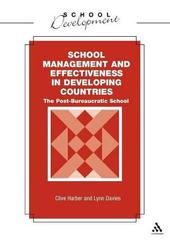
|
School Management and Effectiveness in Developing Countries: The Post-Bureaucratic School
Paperback / softback
Main Details
| Title |
School Management and Effectiveness in Developing Countries: The Post-Bureaucratic School
|
| Authors and Contributors |
By (author) Professor Clive Harber
|
|
By (author) Lynn Davies
|
| Physical Properties |
| Format:Paperback / softback | | Pages:200 |
|
| ISBN/Barcode |
9780826479105
|
| Classifications | Dewey:371.20091724 |
|---|
| Audience | | Tertiary Education (US: College) | | Professional & Vocational | |
|---|
|
Publishing Details |
| Publisher |
Bloomsbury Publishing PLC
|
| Imprint |
Continuum International Publishing Group Ltd.
|
| Publication Date |
8 December 2005 |
| Publication Country |
United Kingdom
|
Description
This series looks at how teachers can develop their schools through the curriculum, classroom techniques and performance indicators. It presents practitioners' accounts of school improvement, combined with an overview of school development policy. These books will be invaluable for teachers, students teachers, administrators and advisers throughout education. This book is quite different from existing 'Western' books on school effectiveness. It describes and analyses the way in which schools operate in developing countries and also tries to explain why they are as they are. Examining them at three levels - the macro, the meso and the micro - the authors use a theoretical framework that they have termed 'post-bureaucracy.' The book has four interlinked sections. First the authors examine the existing economic and theoretical contexts around school effectiveness, including an analysis of the causes of economic crisis and its impact on school management. In the second section the analysis of schools as bureaucratic facades is proposed. The reality of school life, from which any theory of school effectiveness must derive, is illustrated by an ethnographic account of the job of the headteacher in developing countries. The third section explores different ways to understand this reality, operating on three levels: global relationships, national and community cultures, and individual agency. In the final section Haber and Davies draw these levels and realities together. They argue for the democratization of schools as the only way forward for effective education for development.
Author Biography
Clive Harber is Emeritus Professor of International Education at the University of Birmingham, UK, and Honorary Professor of Education at the University of KwaZulu Natal, South Africa. Lynn Davies is Professor of International Education at the School of Education, University of Birmingham.
|